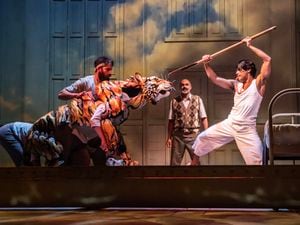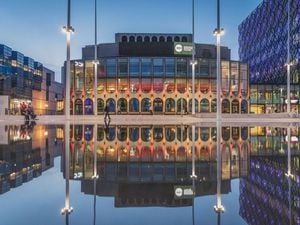Hedda Gabler, Wolverhampton Grand Theatre - review and pictures
The National Theatre’s production of Ibsen’s Hedda Gabler, a tale of tedium within a failed marriage, plays at the Wolverhampton Grand Theatre this week.
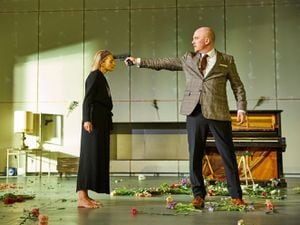
It comes to the city centre venue as part of the current UK tour following a sell-out, critically-acclaimed West End run.
It is always a treat when a National Theatre production comes to town and this one is certainly no exception.
Deemed to be the female equivalent to The Bard’s Hamlet, Hedda Gabler is classed as the most extreme dramatic role for a woman in theatre today - and it comes with an impressive production team.
Olivier Award-winning playwright Patrick Marber and Olivier and Tony Award-winning director Ivo van Hove have breathed new life into the classic, with a contemporary, cutting edge production starring actress Lizzy Watts, probably best known as Nancy in ITV drama The Durrells in Corfu, in the title role.

Despite having just returned from her honeymoon, Hedda Gabler longs for her freedom. Trapped in a loveless, stifling marriage, her boredom soon turns to destruction as she begins to influence her sorry situation, via a series of manipulative actions and treacheries against her nearest and dearest, in an attempt to control her own life.
A free spirit, it seems Hedda will stop at nothing to escape.
What is so evident about the current version of this play is that although it was written well over a century ago, the struggles the storyline conveys are just as prevalent today. Despite feminism, emancipation, women’s rights - call it what you will - the fact remains that even in this day and age, some females remain in doomed relationships, for all sorts of reasons, constantly dreaming of breaking away.

Take away the sleek, modern-day scenery, the fashionable costumes and excellent lighting effects, courtesy of Jan Versweyveld, and you are still left with an exceptional production. In fact, it could be void of all props and it would still be inimitable, as it is the brilliant adaptation of the script which makes it so unique and of course, the outstanding dramatic performances from all involved.
In theory, the clean lines of the open stage set with few items or colours to distract, should offer a sense of liberation, yet Lizzy Watt’s performance perfectly portrays the feeling of being trapped, suffocated and even buried alive within her relationship, as she uses every inch of the space available in an outstanding physical execution of this desperate character. She expresses Hedda’s sense of abandonment and ruthlessness superbly.
Her actions at times are pure evil and yet Miss Watt’s characterisation almost leaves you feeling sorry for Hedda and she is even a little likeable and certainly witty. But then of course the play was originally written as a comedy and so the subtle comedic moments, though few and far between, do lighten the moment.
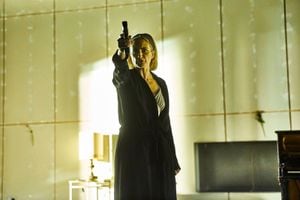
This is an exceptional cast all round. Though the title role dominates much of the proceedings, the complex characterisations of everyone on stage are exceptionally strong and well executed. No one is quite what they appear to be here.
Adam Best as Brack appears charismatic and heroic to begin with, but soon the undertones of menace and control become all too evident as the play progresses.
Abhin Galeya as Tesman succeeds in portraying the unsuspecting husband, clearly oblivious to her thoughts, or is he?
Annabel Bates shines as Mrs Elvsted, a good friend to the Tesmans but who clearly has won the affections of Hedda’s husband, while you could hear a pin drop when Richard Pyros, the ill-fated Lovborg expresses him total despair at losing his life’s work.
The remaining supporting cast members, though appearing only briefly, are all well cast and deliver their minor roles with ease completing a carefully chosen cast for a classic play.
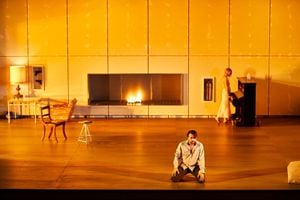
The use of the auditorium with the actors leaving and entering the stage via sets of treads either side of the performance space defines the contrast between the freedom of the outside world and Hedda’s imaginary prison and the interjection of Joni Mitchell’s song Blue and David Bowie’s Wild Like the Wind create an eerie, uncomfortable atmosphere which simply adds to the tense mood.
As Ibsen himself said: “The demon in Hedda is that she wants to influence another human being, but once that has happened, she despises him.”
And that perfectly describes the heroine and her actions.
Compelling and captivating drama, Hedda Gabler must surely be one of the National Theatre’s most prolific offerings to date and a must see.
Runs till Saturday.
For tickets call 01902 429212 or visit www.grandtheatre.co.uk
By Alison Norton


